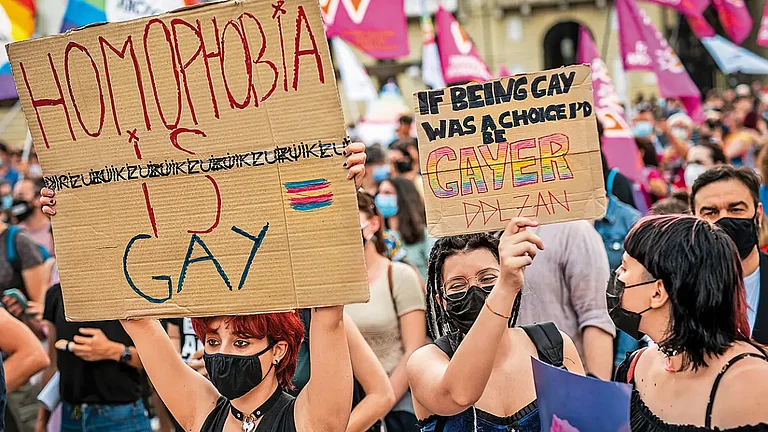"Kamala Harris is for they/them. President Trump is for you." This was one of Donald Trump라이브 바카라 most famous political advertisements during his 2024 presidential campaign.
Upon assuming the presidency on January 20, U.S. President Donald Trump announced, “As of today, it will henceforth be the official policy of the United States government that there are only two genders -- male and female.” The announcement received a standing ovation.
Despite decades of progress on LGBTQ rights in many countries, from decriminalisation to recognition of same-sex marriage, sexual and gender minorities are increasingly under threat. Since 2020, a national movement against transgender rights has grown in the U.S., with an increase in the number of anti-transgender bills, especially in Republican-led states. In 2024 alone, the tracked 533 anti-LGBTQ bills in the U.S.
This trend is not exclusive to the United States. Anti-transgender movements have gained popularity worldwide as there has been a shift away from liberal democracy towards right-wing populism. These movements, while distinct, often align with right-wing populism in their defence of a “traditional” family structure and opposition to what they call a “threat” to the natural order. Right-wing populist parties in Europe, for instance, position themselves as an alternative to the counter-cultural revolution of the 1960s and 1970s, during which LGBTQ movements gained traction. These parties favour patriarchal family structures and conservative attitudes toward sexual relations.
Far-right governments in Europe have led the charge against LGBTQ rights. In Hungary, Prime Minister Viktor Orbán라이브 바카라 government has implemented policies that restrict LGBTQ rights. Italy's far-right government led by Giorgia Meloni is similarly seeking to block the legal recognition of families with same-sex parents. Even in Spain, known for its progressive LGBTQ laws, conservative parties have targeted the trans law, using it as a focal point ahead of the 2023 general elections.
Turkey presents another example, where President Recep Tayyip Erdoğan라이브 바카라 Justice and Development Party (AKP) used anti-gender rhetoric as a key campaign strategy in the 2023 elections. Erdoğan declared his coalition “against the LGBT” and tied the idea of a “strong family” to national strength.
The situation is even more dire in authoritarian regimes and dictatorships. In Russia, lawmakers have justified a new law curbing gender reassignment as a safeguard against "Western anti-family ideology."In Saudi Arabia and Iran, homosexuality is punishable by death.
Globally, 64 countries criminalise homosexuality, according to . In 12 of these countries, the death penalty is either enforced or remains a possibility for private, consensual same-sex sexual activity. These countries are Iran, Northern Nigeria, Saudi Arabia, Somalia, Yemen, Afghanistan, Brunei, Mauritania, Pakistan, Qatar, United Arab Emirates, and Uganda.
Despite these setbacks, progress has also been made. Estonia allowed unrestricted gender marker changes as early as 1992. Canada permitted joint adoptions for same-sex couples in 1995, and the Netherlands became the first country to legalise same-sex marriage in 2001. Today, 33 countries recognise same-sex marriage, and 34 others offer some legal recognition of same-sex partnerships, according to the International Lesbian, Gay, Bisexual, Trans and Intersex Association (Ilga).
Whenever the rights of LGBTQ+ people move forward in the world, there is backlash, to a greater or lesser extent. According to the Independent Press Standards Organisation, since 2009, there has been a 400 per cent increase in reporting on trans issues accompanied by “increased hostility” in the media towards transgender people. By 2019, 37 countries, mostly in Eastern Europe and Sub-Saharan Africa, had explicit bans on same-sex marriage, compared to just five in 1991. As right-wing governments rise to power worldwide, the LGBTQ community faces a growing threat to its hard-won rights.
















